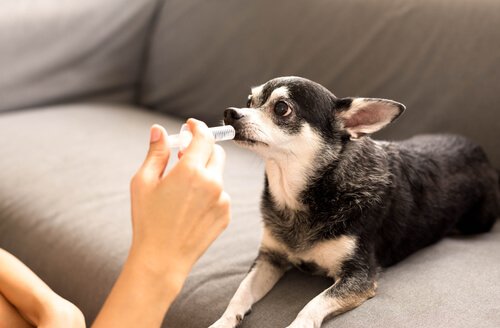Should I Give My Dog Vitamins?

None of us would think twice about taking our vitamins, as they’re so important for our diet and nutrition. But when it comes to giving our dog vitamins, we’re not so sure. Is it safe to do so? Are they better off without them? How can we find out?
Well, that’s why your friends at My Animals are here to help. We’ll tell you all about vitamins for your dog and other interesting topics to do with pet care.
Can you give your dog vitamins?
The answer is yes. But you can only give him vitamins that are designed especially for him, not ones that are meant for humans. You can find vitamins prepared for dogs in pet stores.
Although they’re suitable for dogs, you can’t just give them to him whenever you want. He should only take the vitamins when necessary. If you don’t follow that guideline, he could overdose on the vitamins and experience a lot of problems.

We say overdose because the dog food your pet eats should already contain all the minerals and vitamins he needs. So, the question is, when do you need to give your dog vitamins?
When can I give my dog vitamins?
Dogs with homemade diets
Dogs that have a homemade diet may lack some necessary vitamins. This is because their owner may not know their exact nutritional needs in order to give them a balanced diet.
In this case, it’s a good idea to supplement his diet with the vitamins that will help his organs function well. Experts believe that it’s actually best to just feed your pet dog food.
Vitamins vs complexes
There are many reasons that a dog may have to take vitamins. For example, if he has anemia, is ill or is too thin, then vitamins are absolutely necessary in these cases. However, he won’t be taking vitamin complexes, just the vitamins that will specifically treat his problem. Like we always say, it’s best to ask for help from your veterinarian.
Dogs with illnesses
Each vitamin has a different composition and purpose. For example, vitamin B is used to treat nerve problems, and B1 can be great for old age.
So, the right dosage of the right vitamins can provide your dog with a better quality of life. However, if you’re giving your pet the right food for his specific problem, and it’s high quality, he should be fine without the vitamins.
As you can see, what you feed your pet will have a direct impact on his health; it can either improve it or make it worse. Although high-quality foods that are made specifically to treat a certain condition are more expensive, it’s worth the effort and expense. A proper diet can extend your pet’s life and make him healthier.
Vitamins for humans?

As a general rule, you shouldn’t give your dog vitamins that are made for humans. Dogs are basically carnivorous beings that have different needs to us.
However, there are some types of vitamin complexes that you can give your dog in the right dose. But remember, it should always be the veterinarian who authorizes the dosage. An excess of vitamins, or taking them incorrectly, can cause a lot of problems for your pet.
The human vitamins that have been authorized for dogs are:
- Multivitamins complexes
- Vitamins for joints
- Probiotics
- Fish oil
However, even in these cases, we can always substitute vitamins for natural food. For example, there are probiotics in yogurt and he can get his Omega3 and fish oil from fish. Whatever you decide to do, always be sure to check with your veterinarian first.
None of us would think twice about taking our vitamins, as they’re so important for our diet and nutrition. But when it comes to giving our dog vitamins, we’re not so sure. Is it safe to do so? Are they better off without them? How can we find out?
Well, that’s why your friends at My Animals are here to help. We’ll tell you all about vitamins for your dog and other interesting topics to do with pet care.
Can you give your dog vitamins?
The answer is yes. But you can only give him vitamins that are designed especially for him, not ones that are meant for humans. You can find vitamins prepared for dogs in pet stores.
Although they’re suitable for dogs, you can’t just give them to him whenever you want. He should only take the vitamins when necessary. If you don’t follow that guideline, he could overdose on the vitamins and experience a lot of problems.

We say overdose because the dog food your pet eats should already contain all the minerals and vitamins he needs. So, the question is, when do you need to give your dog vitamins?
When can I give my dog vitamins?
Dogs with homemade diets
Dogs that have a homemade diet may lack some necessary vitamins. This is because their owner may not know their exact nutritional needs in order to give them a balanced diet.
In this case, it’s a good idea to supplement his diet with the vitamins that will help his organs function well. Experts believe that it’s actually best to just feed your pet dog food.
Vitamins vs complexes
There are many reasons that a dog may have to take vitamins. For example, if he has anemia, is ill or is too thin, then vitamins are absolutely necessary in these cases. However, he won’t be taking vitamin complexes, just the vitamins that will specifically treat his problem. Like we always say, it’s best to ask for help from your veterinarian.
Dogs with illnesses
Each vitamin has a different composition and purpose. For example, vitamin B is used to treat nerve problems, and B1 can be great for old age.
So, the right dosage of the right vitamins can provide your dog with a better quality of life. However, if you’re giving your pet the right food for his specific problem, and it’s high quality, he should be fine without the vitamins.
As you can see, what you feed your pet will have a direct impact on his health; it can either improve it or make it worse. Although high-quality foods that are made specifically to treat a certain condition are more expensive, it’s worth the effort and expense. A proper diet can extend your pet’s life and make him healthier.
Vitamins for humans?

As a general rule, you shouldn’t give your dog vitamins that are made for humans. Dogs are basically carnivorous beings that have different needs to us.
However, there are some types of vitamin complexes that you can give your dog in the right dose. But remember, it should always be the veterinarian who authorizes the dosage. An excess of vitamins, or taking them incorrectly, can cause a lot of problems for your pet.
The human vitamins that have been authorized for dogs are:
- Multivitamins complexes
- Vitamins for joints
- Probiotics
- Fish oil
However, even in these cases, we can always substitute vitamins for natural food. For example, there are probiotics in yogurt and he can get his Omega3 and fish oil from fish. Whatever you decide to do, always be sure to check with your veterinarian first.
All cited sources were thoroughly reviewed by our team to ensure their quality, reliability, currency, and validity. The bibliography of this article was considered reliable and of academic or scientific accuracy.
Houpt, K. A., & Zicker, S. C. (2003). Dietary effects on canine and feline behavior. Veterinary Clinics of North America – Small Animal Practice. https://doi.org/10.1016/S0195-5616(02)00115-8
This text is provided for informational purposes only and does not replace consultation with a professional. If in doubt, consult your specialist.








